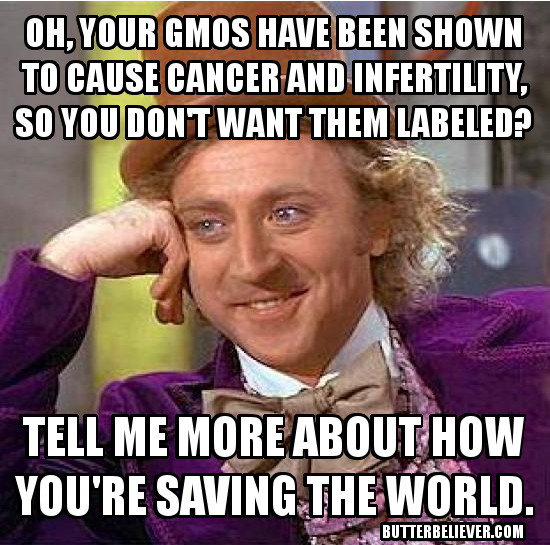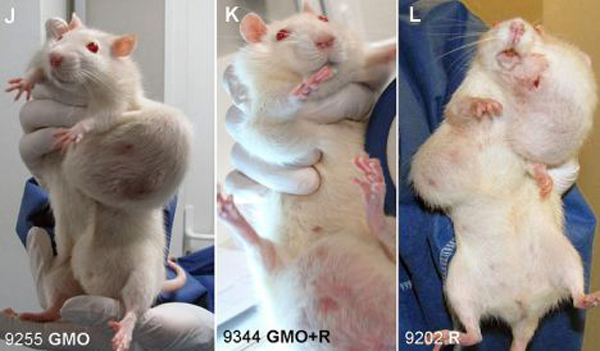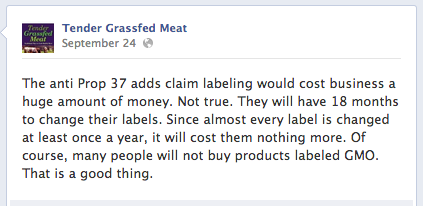When I first heard about California’s Proposition 37, a ballot initiative that will require the labeling of genetically-modified foods, I was ecstatic! My first thought was that this revolutionary law would be a huge catalyst to bringing serious change to the dismal state of our modern food system and pose a serious threat to GMO corporate giants like Monsanto. Who, of course, would be vehemently against Prop 37, I assumed. They don’t want the average person to have a clue what they’re doing with their frankenfood.
But it wouldn’t matter, I thought, because what logical argument could Monsanto possibly have to convince the public to vote “no” on Prop 37? Why would anyone (other than the companies profitting off GMOs) not want GMOs to be labeled? A campaign against the bill would be so blatantly stuffed full of nonsensical Monsanto propaganda that surely no one would buy it, right?
Right. Which is why Monsanto and their minions have pooled together over $36 MILLION DOLLARS to throw at the anti-Prop 37 campaign they made up in a desperate attempt to gain support for their side, against the GMO labeling law.
They really are pulling out all the stops with this one, you guys. Outright lies, hilariously obvious logical fallacies, and outrageously baseless claims abound in the No on 37 campaign. Let’s go ahead and pick them apart, one ridiculous untruth at a time.
These claims are straight from the No on Prop 37 website, which I won’t link to because that would benefit them, but I will copy and paste their “facts” from it here.
“Prop 37 conflicts with science” because GMOs are “perfectly safe”
Biotechnology, also called genetic engineering (GE), has been used for nearly two decades to grow varieties of corn, soybeans and other crops that resist diseases and insects and require fewer pesticides. Thousands of common foods are made with ingredients from biotech crops. Prop 37 bans these perfectly safe foods only in California unless they’re specially relabeled or remade with higher cost ingredients.”
Perfectly… safe?
…Ohhhh!
OMG. I’m so sorry, Monsanto.
See, I was under the weird assumption that splicing the genes of another species into the food we eat wasn’t really a very natural thing to be doing, and since those are genes you’re messing with — you know, the blueprint of all life that determines how we develop and function — that maybe (and this is a real stretch!) consuming organisms that have been genetically modified could have an impact on our own DNA, and the health of our bodies.
But clearly I was wrong!
For the sake of validity though, would you mind showing just one single study that scientifically confirms that the consumption of GMOs is “perfectly safe?” I’m sure that in those two decades you’ve been dumping this stuff into our food system, somewhere along the line it might have been looked into.
It’s okay, I’ll wait.
WHAT’S THAT?!
You mean to tell me you don’t have one?!
Well, golly-gee gosh darn ya to heck, Monsanto! I don’t know that I can believe you, then! Because see, I’ve got a report of this study right here done by French scientists that show that your GMO corn caused massive cancerous tumors, liver damage, and kidney failure in rats (which was worrisome enough to the Russian government that they banned the import of GM corn).
And this one here showing that GMOs caused an inability to reproduce after multiple generations of consuming them.
And this one here showing that GMO genes transfer into living bacteria in human intestines.
Hmm. I don’t know that I’m all that convinced of your GMOs “perfect” safety, my friends!
Because if you can’t prove to me that GMOs aren’t linked to cancer, infertility, birth defects, immune system failure, accelerated aging, faulty insulin regulation, allergies, and organ damage, like everyone else who isn’t tied to financial gains from the GMO industry is saying, then I’m gonna go ahead and make the wild assertion that it would probably be a good idea that we at least label them until you can prove their safety.
“Prop 37 is full of special interest loopholes and exemptions”
“Prop. 37 is full of absurd, politically motivated exemptions that make no sense. It requires special labels on soy milk, but exempts cow’s milk. Dairy products, eggs, meat and poultry are all exempt. Fruit juice requires a label, but alcohol made with some of the same GE ingredients is exempt. Food sold in a grocery store requires a label, but the same food sold in a restaurant is exempt. Food imported from China and other foreign countries are exempt if sellers simply claim their products are “GE free”. Unscrupulous foreign companies can game the system.”
W—wait a second.
You’re trying to tell me that you – the makers of GMOs — are not in favor of the proposed GMO labeling law, because it doesn’t require enough labeling?
You guys. I can barely breathe. This is just, beyond hilarious.
That’s like saying you’re not in favor of the gas tax because it doesn’t also tax bicycles or tennis shoes.
(Except it’s not, really. Because the labeling laws are nothing like taxes. It’s not the government telling food companies they need to pay out more money, it’s telling them they need to regulate an aspect of their product that affects the consumers safety and well-being.)
Here’s the deal though — biotech companies are the ones profiting off of GMO-fed dairy, eggs, and meat; GMO-produced alcohol, and GMO ingredients in restaurant food. You can’t honestly say that you’re not behind this law because it isn’t strict enough on you.
The only ones that have any reason to be miffed about the “exemptions” for animal products, alcohol, and restaurant food are the processed food manufacturers that will be required to label the GE ingredients in their food, while those other categories of food manufacturers won’t have to change their labeling practices.
But, let’s think about this for a minute. There aren’t GM ingredients in the actual animal products — they’re in the feed the animals eat — so obviously they wouldn’t be on the label as an ingredient of the animal product foods themselves.
And restaurants, have never been required to label ingredients in the food they serve. That would require an entirely separate law in and of itself just to begin labeling food in restaurants. It’s not an “exemption” that they wouldn’t have to label GMOs. They don’t have to label anything! Similarly, alcohol products are not required to have ingredients labeled, because alcohol labeling is regulated under different laws than food at the state and federal level. Prop 37 is only proposing GMO labeling in foods. Nice try.
Oh, but then there’s the “China’ll cheat the system!” argument. Yeah. So, you’re basically pissed that other countries with lesser food safety regulations can make claims that their products are natural and free from harmful substances without the government calling them out on their BS?
Kinda like you’ve been doing this whole time?
Aww. It really does suck to be you, Monsanto. Every time people start figuring out how dangerous your products are (like DDT and Agent Orange), they stop using them, and then those damn informed consumers start pressuring the big, mean government to come in and start regulating what you’re doing, and then you have to pay off more and more government officials to protect you for the next go-around, but it’s just. So. Difficult. China has it soooo easy.
With these pesky new labeling laws, people might get wise and stop trusting your products. It’s just terrible. Maybe you ought to reconsider your headquarters for dominating the world’s food supply and slowly sterilizing the general population?
You know, I hear Beijing is lovely in the fall.
“Prop 37 means more bureaucracy and taxpayer costs”
“Prop 37 forces state bureaucrats to administer its complex requirements by monitoring tens of thousands of food labels at tens of thousands of grocery stores, retail outlets, farms and food companies. In fact, it sets no limit on how many millions would be spent on bureaucracy, red tape and lawsuits. It’s a blank check… paid by taxpayers.”
Right, because, no one is currently monitoring food labels. They don’t have to label GMOs currently, but manufacturers can easily just go ahead and put whatever they want in their processed foods, give no indication of its nutritional content or ingredients, and just hurl it off to retailers to be put into the hands of consumers who have no clue what’s in the food they’re eating.
Oh, wait. That would be illegal.
The FDA has been “administering [the] complex requirements” of monitoring food labeling since 1990. This is not a new concept. Nor is it any more “complex” than ensuring the amount of trans fat in a food is labeled, just as it’s been since 2006. Nor would it cause any more of a burden on “grocery stores, retail outlets, [and] farms” than any other food labeling.
Did you guys even read the proposition, Monsanto?
The only items grocers would have to ensure labeling with themselves are raw crops that have been genetically modified — like sweet corn, papaya, or certain varieties of squash. That’s about it, by the way, as far as the short list of fresh crops available to the consumer which have been genetically modified.
And the responsibility of the grocer is pretty simple — if they are cool with carrying GMO foods, they can simply mark the bin of GM produce with a single label indicating it as such. If not, they can ask their supplier with a sworn statement that the crop is not genetically engineered, and the burden’s off of them.
The only one bearing the responsibility of labeling genetically modified ingredients is packaged food manufacturers, who have already been required to label the ingredients in their products for decades.
And as far as that “blank check paid by taxpayers?” The state’s official analyst has said that the cost of monitoring just one more aspect of food labeling would cost each Californian… wait for it…
BETWEEN ONE AND THREE WHOLE PENNIES. Each and every year!
Last time I checked, cancer was just a smidge more expensive. So, you know, weigh your options. But for me, I think I’d take the three-cent investment versus unintentionally ingesting incalculable amounts of genetically-modified organisms that could slowly render me infertile and kill off vital organs and give me massive tumors like these poor little guys.
“Prop 37 authorizes shakedown lawsuits”
Prop 37 was written by a trial lawyer to benefit trial lawyers. Its primary sponsor is a trial lawyer whose firm and organization have made more than $3 million suing under the terms of another proposition he helped write. Prop 37 creates a whole new class of “headhunter lawsuits,” allowing lawyers to sue family farmers and grocers without any proof of harm. It subjects farmers, grocers and food companies to huge litigation costs and lawyer payouts.”
So now, let me get this straight, Monsanto. GMOs are “perfectly safe,” but if someone becomes seriously ill as a result of consuming them, they might have more of a case to sue you and your clientele because the government has indicated that GMOs aren’t just regular, “perfectly safe” foods?
Oh, wait, wait. They could sue you without any proof of harm? Really?!
Ouch. Yeah, I could see how that would be a problem for you guys. If that were actually a part of this legislation.
But getting back to that whole, “creating a new class of ‘headhunter lawsuits'” thing. To benefit those money-grubbing “trial lawyers.”
Pretty weird that you reached that conclusion, Monsanto, considering that “Prop 37 offers no economic incentives for lawyers to sue. Consumers can’t file a class action without first giving notice and if the defendant fixes the labels, then no class action is permitted. And any penalties from a violation go only to the state, not the plaintiff or lawyer.” (source)
And as for those “family farmers” that buy your products and the grocers that sell them being sued? Well, you yourselves are sure doing a great job of implementing all kinds of “shake-down” suits against them, seeing as how you, Monsanto, have “a policy that prohibits farmers from saving or reusing the seeds once the [GMO] crop is grown, ensuring that farmers have to buy new seeds every year… The company has filed lawsuits around the country to enforce its policy against saving the seeds for the future.” (source)
But a basic understanding of legal principles in this country would tell you that legal liability for violating a law falls on the person responsible for complying with the law. Duh. Anyone who’s watched an episode of Judge Judy could tell you that.
So once again, legal responsibility here falls on the manufacturers of packaged foods. Retailers, again, are only responsible for labeling raw agricultural commodities under the proposed law.
Oh, and, fun factoid for ya. Prop 37 wasn’t “written by a trial lawyer to benefit trial lawyers” at all. It began with a grassroots campaign comprised of thousands of volunteers who garnered a million signatures to get Prop 37 on the ballot. Here’s the truth.
You’re right, though. Prop 37 was written with the help of a lawyer. An environmental lawyer who, yes, previously wrote another proposition intended to allow lawsuits for those who have been harmed from overexposure to toxic chemicals.
Not quite seeing how this is an argument for your case, however. Since when are trained lawyers not involved in drafting new legislation?
And also? How many millions of dollars have you made profiting off of the absence of labeling your GMO foods, Monsanto? Pretty sure that’d be a helluva lot more than a paltry $3 mil to you guys.
“Prop 37 means higher food costs”
Prop 37 forces farmers and food companies to implement costly new labeling, packaging, distribution, recordkeeping and other bureaucratic operations that will cost billions of dollars to implement. Or, companies will be forced to switch to higher-priced, non-GE ingredients, like organics, in order to sell food in California. Economic studies show this would increase food costs for the average family by hundreds of dollars per year – a hidden food tax that would especially hurt seniors and low-income families who can least afford it.”
Hundreds per year, huh? According to that study you funded showing that if all companies reformulated their ingredients to exclude GMOs that there would be that kind of a price increase?
Well that’s weird. Because Prop 37 doesn’t force any companies to do that, and it would actually pose precisely no increased cost to consumers, according to independent research.
And “costly new labeling?” I think author Stanley Fishman of Tender Grassfed Meat debunks that ridiculously bogus assertion pretty well:
Let’s be real here. You’re trying to tell me that all those poor, lowly mom ‘n pop shops — like PepsiCo and Kraft Foods and General Mills — can’t afford to change their labels within 18 months?
Huh. Maybe they could have had an easier time with that, if they weren’t contributing millions of dollars as your biggest customers to fund your anti-labeling campaign.
I guess they could be faced with that dismal alternative of, you know, not dumping GMOs into their food. (Or worse, switching to —gasp!— “organics!”)
Now, riddle me this. Why is it that you think companies who buy your GMO ingredients will be “forced” to switch to non-GMO ingredients, Monsanto? It’s not because the Prop 37 law would force them to. The proposed law clearly states that GMOs will not be banned, but will only require labeling.
Could it be that most companies are fully aware that they are deceiving the average consumer by not labeling the genetically-modified ingredients in their foods, and that if they were required to label them, sales would drop because consumers don’t want to be eating GMOs?
And so, what you’re really saying, is that the “average family” is going to become educated enough by the GMO labeling to come to the conclusion that the GMO products may not be “perfectly safe,” and may choose to not buy them. They would then choose to buy products that may be higher in price. They would then willingly be providing more revenue for the businesses that sell non-GMO foods and boost their economic growth.
Tell me again how that’s supposed to equate to a “hidden tax” suddenly hurled upon these poor “average families” that they cannot escape from?
But certainly, not every single food-producing company is going to immediately jump ship on the GMO game and stop using your products as ingredients in their foods. After all, you’ve done one hell of a job convincing people with your deceptive advertising that GM foods are so super awesome and we should all totally not care about finding out whether or not they’re in our food.
Companies aren’t going to stop manufacturing foods with GMO ingredients in them entirely. Kinda like how no one stopped manufacturing foods with all sorts of chemical preservatives in them once that legally required labeling in the 90’s. Or in ’06 when we started labeling trans fat.
And people can continue to buy all the genetically-altered frankenfood they want after it’s put on the label. Labels don’t forbid manufacturers from putting just about whatever kind of toxic crap they want into their food, nor do they stop every consumer from buying them.

Please click to donate to the YES on 37 campaign so consumers can become educated about Monsanto’s ridiculous lies.
The right to know
It all boils down to this.
We started labeling foods 22 years ago because if companies have the right to be selling food to consumers, those consumers should have the right to know what’s in it.
Prop 37 is proposing merely another extension of the labeling laws we already have in place. Our food system is changing, and food labels need to be changing along with it.
Do you think you have the right to know what’s in your food?
Share your thoughts about Prop 37 (and the absurdity of the No on 37 campaign) below.








Emily, I LOVED this article. As you can see above, I linked to it in my post on GMOs. But now I’m not sure about what I did. I put your picture in my post as a link to get people to click over to your site. Now that I think about it, that seems like a breach of copyright. All of this new picture stuff with pinterest and facebook and blog posts is confusing at times. Should I take the picture out or leave it there? – I want to make sure I do things right.
You are so sweet! You can use whatever pictures of mine you want. Especially when you’re using them to link back! 🙂 Thanks, Missii!
This proposition is only for California why do other states not have a voice? I would love to be able to vote yes. Do I need to draw up a petition in my state? Great article very informative if I had the funds I would tape this info on the front door of every home, sad how uninformed people are.